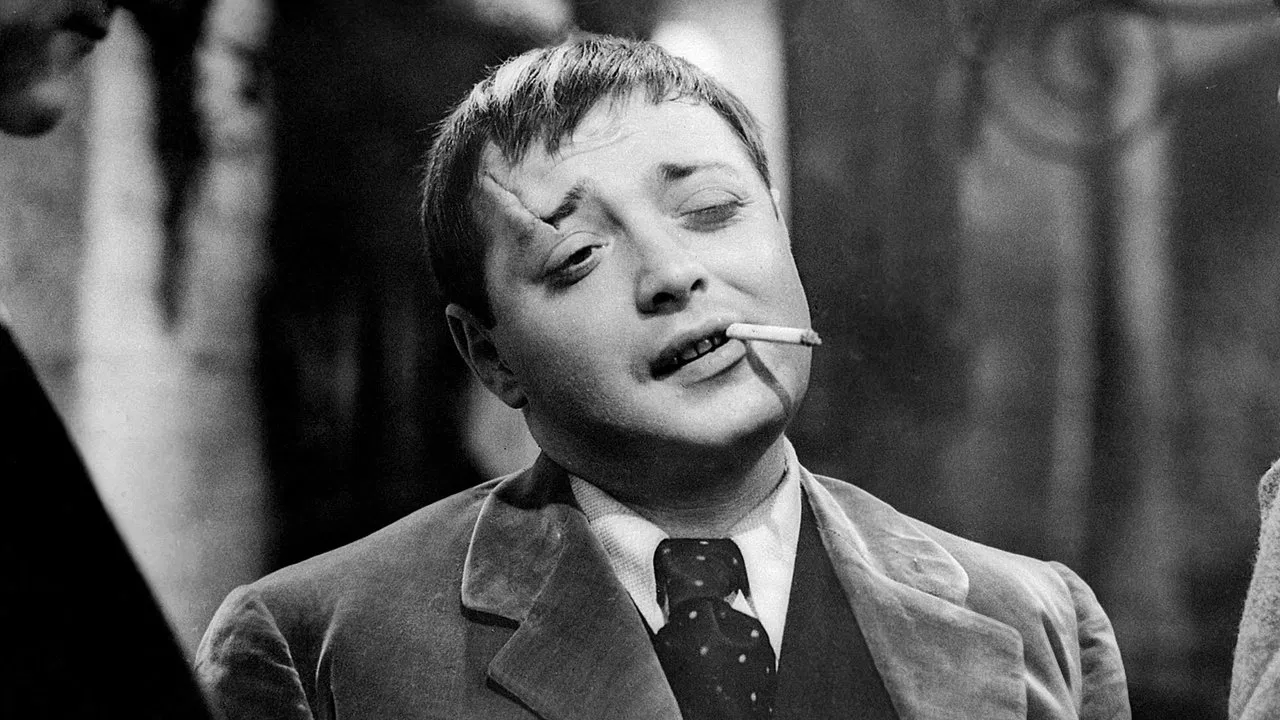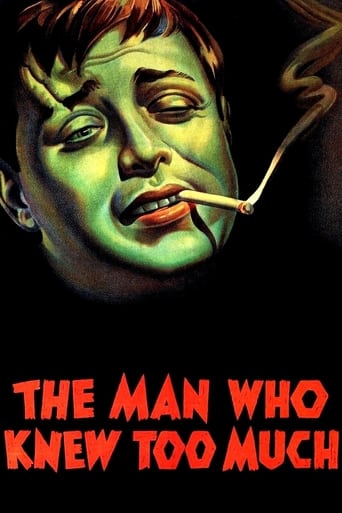

The Worst Film Ever
... View MoreSlow pace in the most part of the movie.
... View MoreI gave this film a 9 out of 10, because it was exactly what I expected it to be.
... View MoreThis movie tries so hard to be funny, yet it falls flat every time. Just another example of recycled ideas repackaged with women in an attempt to appeal to a certain audience.
... View MoreOne of Alfred Hitchcock's earliest classics, made before he came to Hollywood. A couple's daughter is kidnapped to keep her parents quiet about an assassination plot. The couple is played by Leslie Banks and Edna Best. Banks is good in a role that's a long way from his florid performance in The Most Dangerous Game from a couple of years earlier. Best is impressive in a sympathetic turn. Peter Lorre is menacing and even a little creepy as the leader of the assassins. This was his first English-speaking role (he learned the language while filming). Nice photography from Curt Courant and some fun little creative touches from Hitchcock. The dry humor is blended nicely with the action and suspense. The cult of sun worshippers and The Royal Albert Hall scene are both worthy of Hitch's highlight reel. Perhaps one too many abrupt cuts from one scene to the next, often as a character is in mid-sentence. But clearly Hitch was still honing his craft. At least he was trying things as opposed to the static direction of many of his contemporaries.Remade in 1956 by Hitchcock himself, with James Stewart and Doris Day. That version is more polished and "Hollywood," and is arguably the more popular of the two. Although neither film is perfect, I prefer this one. It may not have the two decades of advancements in production techniques or the bigger budget of the remake, but it has a tighter plot, shorter runtime, faster pace, darker tone, and it builds suspense without the distracting side stuff of the remake. Plus there's no incongruous scenes of Doris Day singing.
... View MoreIn Hitchcock's 'British' version of the film made two decades before the one with Jimmy Stewart and Doris Day, it's the villains who are really well cast, with Peter Lorre and Cicely Oates turning in deliciously creepy performances. And there are some really nice touches here – the scene in the dentist's chair (who doesn't squirm at least a little seeing that setting, with those tools), a shot of Oates through bleary, hypnotized eyes, and of course the scene in the Royal Albert Hall, where suspense builds with an imminent assassination. It's nice that the film is to the point at 75 minutes, but it's a little awkward in the first part of the film, there are some odd plot points, and the shootout at the end is tediously long (it's telling that Hitchcock would omit that in the 1956 version). It's worth watching but certainly not a classic.
... View MoreI have to wonder if I'd think differently of this film had I seen it before the 1956 film. But, such is the course that life can take, I saw the one with Morroco, James Stewart and Doris Day, and Que Sera Sera first. Though that film may have more of the polish of a seasoned professional in 1956 (in contrast to the young upstart proving himself all over after a string of flops in 1934), it benefits greatly from a longer run-time to give more meat on the bones of the story, and a tighter grip on the suspense.Nevertheless, the original film that one could argue got the career of Alfred Hitchcock much on a roll in the 1930's has much to recommend it for. In this story that starts off in Switzerland - "Brotherly Love" except for certain foreign travelers - and a surprise bullet during a dinner party that kills a French spy (with the final words spoken to Jill (Edna Best), on holiday with her husband Lawrence (Leslie Banks) and child and sets a chain of events that leads to kidnapping, an assassination attempt during classical music concert and "Sun Worshipers", it's usually never less than riveting.The director keeps the pace fast - maybe too fast, one could argue. For filmmaking that is so rich and tightly edited and composed with a rhythm that feels just right when Hitchcock and company get into the set pieces, such as the dentist office or the Sun Church, or that final stretch in the gun battle, certain other scenes just feel... flat. All of the main actors are adequate, but it's hard to argue if one prefers this version Banks over Stewart, or even Best over Day. They aren't bad actors in the slightest, but there's little in the way of any personality about them. Best is at her best, so to speak, during that Albert Hall number - actually, I'll give it, she is up to everything else in that sequence and is great.If the plot doesn't leave much room to breathe or anything in the way of character development (different than bits of behavioral humor, which do connect more often than not), there is one ace in the hole for Hitchcock: Peter Lorre. After seeing him in M, he knew he found his Abbot (yeah yeah, odd name, but whatever, this ain't a comedy in THAT way). It's astonishing to read that Lorre didn't know English very well at the time and did the performance phonetically; the way he speaks is cutting at every turn, and he sets the tone for his group of criminals out to wreak havoc on spies and diplomats. He's... cool for such an evil bastard: when the father is anxiously hurling chairs in the church at the other bad guys to get his daughter back, Lorre just leans back on a wall and watches as it happens, knowing it'll play itself out in its way. When things cool down just a bit, he goes face to face with the hero. Close-ups, so intense, with a cigarette always dangling just a little.This is such iconic work for this actor - among his very best, and making it a memorable heel in the Hitchcock canon - that one can (almost) forgive any other flaws in the script, such as rushed exposition, or kind of dropping doing anything with the daughter after a set up with her in Switzerland that made her seem fairly interesting for a minute or two. There's a reason Lorre is on the poster and not Leslie Banks: by the end, it's not like we exactly *want* him to get away, but... the guy's a force of nature, let's put it that way. The Man Who Knew Too Much, both versions, are crackerjack pieces of suspense (with occasional surprise, and there's a difference between the two) and it's admirable how coiled the suspense gets for when it pops.This Hitch guy, watching this, he's going places...
... View MoreI thought this 1934 movie better than the Jimmy Stewart, Doris Day 1956 remake. It seemed by 1956 superannuated director and actors--who knew their importance--remade a 1934 movie and really detracted from the film's storyline by their presence. Something like "The Man who Knew too Much" DIRECTED by Alfred Hitchcock and STARRING Jimmy Stewart and Doris Day. Even the 1954 "Dial M for Murder" seems driven by story line and not by the acting of the performers, no matter how excellent their performance was. In 1934, film was still new and so the production values are those of the 1930s and lacks the polish of later movies. (But look at 1935 "Top Hat" for true sophistication and wit that lasts into 2014--still fresh in 2014.) The story, as others have pointed out,has holes in the plot line--but one senses the fun of making such a movie with such a gruesome subject as kidnap and murder that would be a precursor to "Monk" or "The Pink Panther" where comedy plays an important role in the dark doings of murder and kidnapping.And Peter Lorre shines; one wonders why he wasn't asked to play the villain in the 1956 remake.
... View More